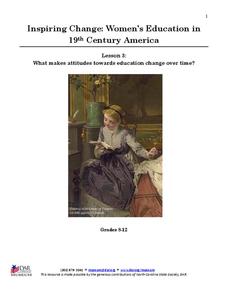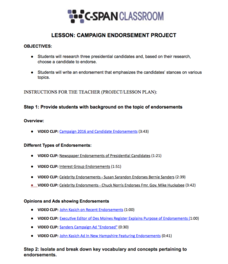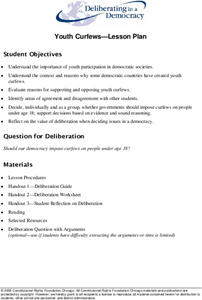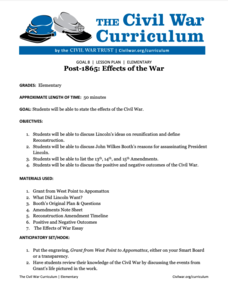Constitutional Rights Foundation
Naturalized Citizens and the Presidency
Article II, Section 1 of the U.S. Constitution takes center stage in a lesson plan that asks class members to assume the role of state senators, debate a resolution to amend the U. S. Constitution to permit naturalized citizens to run...
Minnesota Literacy Council
Introduction to Historical Thinking
Christopher Columbus: hero or villain? Prepare class members for the debate with activities that asks them to think critically about how history is reported.
National Society Daughters of the American Revolution
Lesson 3: What Makes Attitudes Towards Education Change over Time?
The struggle for women's rights is not unique to this generation, or even to the 20th century. Class members explore the conflicting opinions of Alexander Graham Bell and his wife, Mabel Hubbard Bell, regarding women's pursuits of higher...
K20 Learn
What Is It to Be Financially Literate?
What does it mean to be financially responsible? Develop a working definition of financial literacy with your classes. Using six scenarios, learners debate financially literate actions and develop a definition based on their decisions.
Library of Congress
Uncle Tom’s Cabin and the Fugitive Slave Act
From the time of its publication, Uncle Tom's Cabin has been controversial. To better understand the debate, class members first examine a broadside decrying the Fugitive Slave Act of 1850, and then two newspaper reviews of the novel...
C-SPAN
Campaign Endorsement Project
So many politicians, so many endorsements! Learn to differentiate between facts as well as the process of endorsements with an informative resource. Class members watch current endorsement videos, research candidates from three different...
Deliberating in a Democracy
Preventive War
"Those who knocked these buildings down will hear from all of us soon!" - George W. Bush. Scholars investigate and analyze the events of September 11, 2001 in ushering in the Bush Doctrine on foreign policy. Using primary documents as...
Deliberating in a Democracy
Juvenile Justice
Pupils compare and contrast the legal system as it pertains to juvenile and adult crime and punishment. Incorporating primary documents, legal decisions, and video evidence, individuals form an argument debating the treatment of...
Deliberating in a Democracy
National Service
Uncle Sam wants you to serve! Scholars investigate the role of mandatory national service in an open democracy. They research, watch a video, and hold a debate surrounding the issue of requiring one year of service to gain a better...
Deliberating in a Democracy
Youth Curfews
Don't stay out too late! Scholars analyze the need for youth curfews in a democratic society. They examine primary documents, case studies, and short video clips to form their opinions and take a position on the issue. Holding a class...
Constitutional Rights Foundation
Puritan Massachusetts: Theocracy or Democracy?
Was Puritan society governed as more of a theocracy or democracy? After comparing and contrasting a series of primary source documents, middle and high schoolers form small groups and debate the question.
Orlando Shakes
West Side Story: Study Guide
Hey, enough frabbajabba about that stool pigeon, Daddy-O! Using the West Side Story study guide, scholars explore the language of the play and read about its historical associations and themes. Pupils also engage in a Spectrum of...
Council for Economic Education
Fall of Rome
What led to the fall of Rome? Scholars have debated the question since the end of the great empire. Young historians consider the same question through an economic lens using an engaging lesson that involves a hands-on evaluation of the...
Harvard University
Cosmic Questions
Scholars learn the stories of the universe with a unit study on the cosmos. They model the universe, learn about the relationship with the electromagnetic spectrum, understand the big bang theory, and debate the existence of life on...
College Board
2016 AP® Macroeconomics Free-Response Questions
The debate of cupcake versus donuts may seem like a superficial one. However, learners consider whether it makes sense to specialize in producing only one confectionery in a scaffolded problem involving complicated economic concepts....
Judicial Learning Center
The Constitution
Supreme Court justices debate the meaning of the US Constitution, but we expect teachers to explain it to scholars with far less training and experience. A daunting task for sure, but it's not insurmountable with resources that simplify...
The New York Times
Where to Draw the Line: Balancing Government Surveillance with the Fourth Amendment
The question of how to balance Fourth Amendment Rights with national security concerns becomes critical in an age of planned terrorist attacks, election interference, and fake news. Get young social scientists involved in the debate with...
EngageNY
Grade 10 ELA Module 2: Unit 3, Lesson 3
What is in a word? Scholars look closely at the words from a speech by Eleanor Roosevelt. They analyze how she supports a claim without debate and without rejecting others. Learners use jigsaw discussion, guided questions, and respond to...
Women in World History Curriculum
Women and Confucianism
Young historians consider the far-reaching effects of traditional teachings on the debates about the current attitudes toward women in society. The discussion begins with a list of New-Confucian sayings and expands to a global perspective.
iCivics
Supreme Decision
Is the right to wear a band t-shirt included in our freedom of speech? Budding historians consider the question by using a video game. After a brief animated video, users drop in and listen to Supreme Court justices as they debate the...
New York State Education Department
US History and Government Examination: January 2012
What led to the United States Civil War? Interested historians consider a variety of political, social, and economic factors using primary sources and an essay prompt in an authentic high-stakes test. Primary sources include political...
National Woman's History Museum
Martha Hughes Cannon: Doctor, Wife, Mother, Senator
Each state is entitled to two statues in the National Statuary Hall Collection in Washington, D.C. After reading about Utah's debate over whether or not Martha Hughes Cannon should be represented by one of their statues, individuals...
American Battlefield Trust
Post-1865: Effects of the War
What did Lincoln want? Historians still debate this question, and perhaps people will never fully know. Class members examine the legacies of the war, including the Thirteenth, Fourteenth, and Fifteenth Amendments. The lesson plan also...
American Battlefield Trust
Southern Secession and Abraham Lincoln’s Presidential Election
President Abraham Lincoln: a true humanitarian or a savvy politician? The lesson focuses on Abraham Lincoln's presidency and the secession of the southern states. Academics interpret how Lincoln's presidential platform promoting African...
Other popular searches
- Current Events Class Debates
- Lincoln Douglas Debates
- Political Debates
- Classroom Debates
- Nuclear Power Debates
- Candidate Debates
- Ethical Debates
- 2008 Election Debates
- Elections and Debates
- Debates in Groups
- Presidential Debates
- Debates Boston Massacre

























